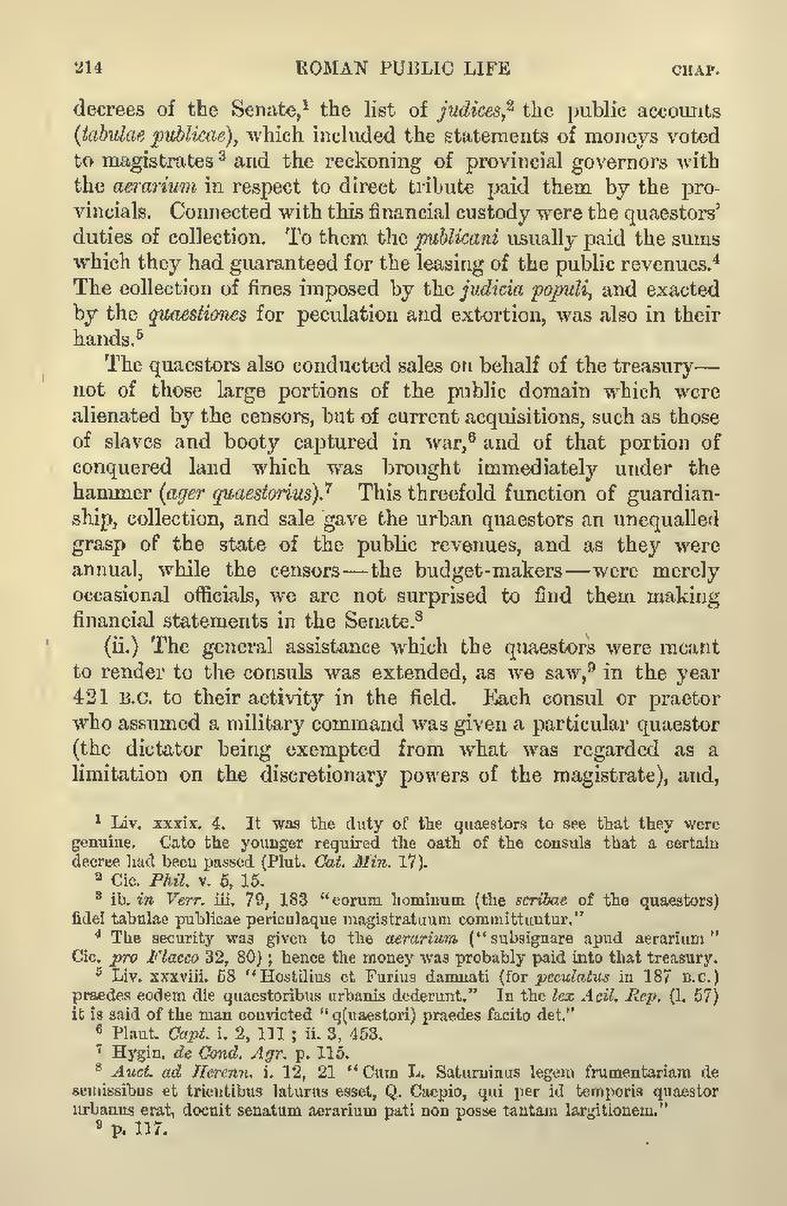decrees of the Senate,[1] the list of judices,[2] the public accounts (tabulae publicae), which included the statements of moneys voted to magistrates[3] and the reckoning of provincial governors with the aerarium in respect to direct tribute paid them by the provincials. Connected with this financial custody were the quaestors' duties of collection. To them the publicani usually paid the sums which they had guaranteed for the leasing of the public revenues.[4] The collection of fines imposed by the judicia populi, and exacted by the quaestiones for peculation and extortion, was also in their hands.[5]
The quaestors also conducted sales on behalf of the treasury—not of those large portions of the public domain which were alienated by the censors, but of current acquisitions, such as those of slaves and booty captured in war,[6] and of that portion of conquered land which was brought immediately under the hammer (ager quaestorius).[7] This threefold function of guardianship, collection, and sale gave the urban quaestors an unequalled grasp of the state of the public revenues, and as they were annual, while the censors—the budget-makers—were merely occasional officials, we are not surprised to find them making financial statements in the Senate.[8]
(ii.) The general assistance which the quaestors were meant to render to the consuls was extended, as we saw,[9] in the year 421 B.C. to their activity in the field. Each consul or praetor who assumed a military command was given a particular quaestor (the dictator being exempted from what was regarded as a limitation on the discretionary powers of the magistrate), and,
- ↑ Liv. xxxix. 4. It was the duty of the quaestors to see that they were genuine. Cato the younger required the oath of the consuls that a certain decree had been passed (Plut. Cat. Min. 17).
- ↑ Cic. Phil. v. 5, 15.
- ↑ ib. in Verr. iii. 79, 183 "eorum hominum (the scribae of the quaestors) fidei tabulae publicae periculaque magistratuum committuntur."
- ↑ The security was given to the aerarium ("subsignare apud aerarium" Cic. pro Flacco 32, 80); hence the money was probably paid into that treasury.
- ↑ Liv. xxxviii. 58 "Hostilius et Furius damnati (for peculatus in 187 B.C.) praedes eodem die quaestoribus urbanis dederunt." In the lex Acil. Rep. (l. 57) it is said of the man convicted "q(uaestori) praedes facito det."
- ↑ Plaut. Capt. i. 2, 111; ii. 3, 453.
- ↑ Hygin. de Cond. Agr. p. 115.
- ↑ Auct. ad Herenn. i. 12, 21 "Cum L. Saturninus legem frumentariam de semissibus et trientibus laturus esset, Q. Caepio, qui per id temporis quaestor urbanus erat, docuit senatum aerarium pati non posse tantam largitionem."
- ↑ p. 117.
